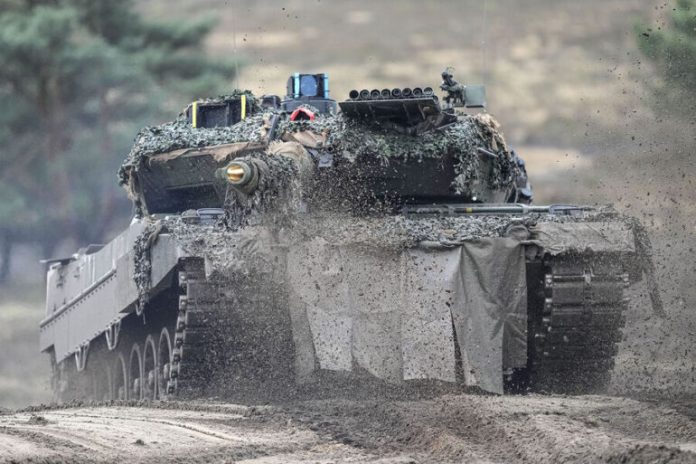On 24 September, the media reported about the capture of a Leopard tank by a group of Russian scouts. A German-speaking crew of the tank was also captured, according to MWM.
On 23 September, the Russian group’s commander said in an interview with state media:
“When we curbed another offensive and ATGM-ed [destroyed with an anti-tank guided missile] the Leopard, we moved out to the burned vehicle hoping to seize the ‘tongue.’ Then we saw that the crew’s driver-mechanic was severely injured and the others were dead. Once he awoke, the mechanic started yelling ‘nicht schiessen’ [‘do not shoot’].”
He also commented on the capture of a surviving mechanic, who spoke German:
“The mechanic repeatedly stated that he was not a mercenary but a Bundeswehr serviceman, and that he and the rest of the crew were members of the same unit of the German army.”
The Russian commander said that the German serviceman had named his brigade and its location. The Russian infantry actively uses various variants of the Kornet anti-tank guided missile. The missile has repeatedly proven its ability to eliminate the best armoured tanks, the British Challenger 2, and is therefore considered more than capable of neutralising all variants of the Leopard 2 even when defeating their tougher frontal armour.
According to multiple reports from various sources, the war in Ukraine involves military personnel from all over the Western world, so the deployment of active military personnel is also not unprecedented, as the German tanker claimed. For example, there is the deployment of British Royal Marines to combat from April 2022, as claimed by Russian sources for months and confirmed by a Marine general in December of that year.
There is an opinion that Western military personnel, whether contract or active duty, will operate many of the sophisticated assets that are routinely transferred to Ukraine. For example, Patriot missile batteries were recently sent to Ukraine, in a much shorter period than it would have taken to train Ukrainian operators.
It is not yet known whether the captured tanker is actually a Bundeswehr soldier or just a contract mercenary. In the former case, this would entitle him to a higher level of treatment as a prisoner of war.
However, reports of German soldiers operating Leopard tanks supplied to Ukraine have the potential to galvanise public support for military action, as the Leopard is the successor to the Panther and Tiger tanks of World War II, when Germany led a European coalition to attack the Soviet Union.
The coming to power of the Olaf Scholz administration in 2022 has had an impact on Germany’s policy towards military action abroad. Germany changed from one of the most reticent to support NATO military action in Eastern Europe to one of the strongest and most committed to supporting military action in Ukraine. Thus, the involvement of contract or even active Bundeswehr soldiers abroad in military confrontations would not be at odds with broader German policy. However, because of the Russia-Ukraine war Germany’s economy has suffered the most severe disruption, with its GDP falling to sixth place behind Russia in 2022.
Since the Ukrainian offensive began in early June, Leopard 2 tanks, including modern variants of the Leopard 2A6, have suffered significant losses in Ukraine. At the same time, losses among older Leopard 2A4 and Leopard 1 tanks have been even more significant. However, it is not known whether the German military has been involved in the war in Ukraine before or whether it has only recently arrived there.
Russian and Western sources have reported that NATO member states may send more troops to Ukraine if the Ukrainian troops fail. Earlier it was assumed that this would be soldiers from Poland of the Baltic states. While sending Ukraine its own tanks, Berlin has also sought to purchase Leopards from third parties, primarily Switzerland, to increase its ability to arm Ukraine. However, precise data on the extent of Germany’s participation in military action in Ukraine, as well as that of a number of other Western countries, is still unknown.
